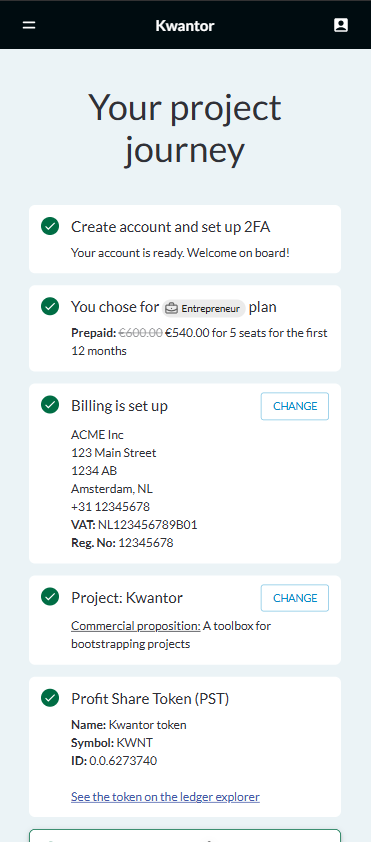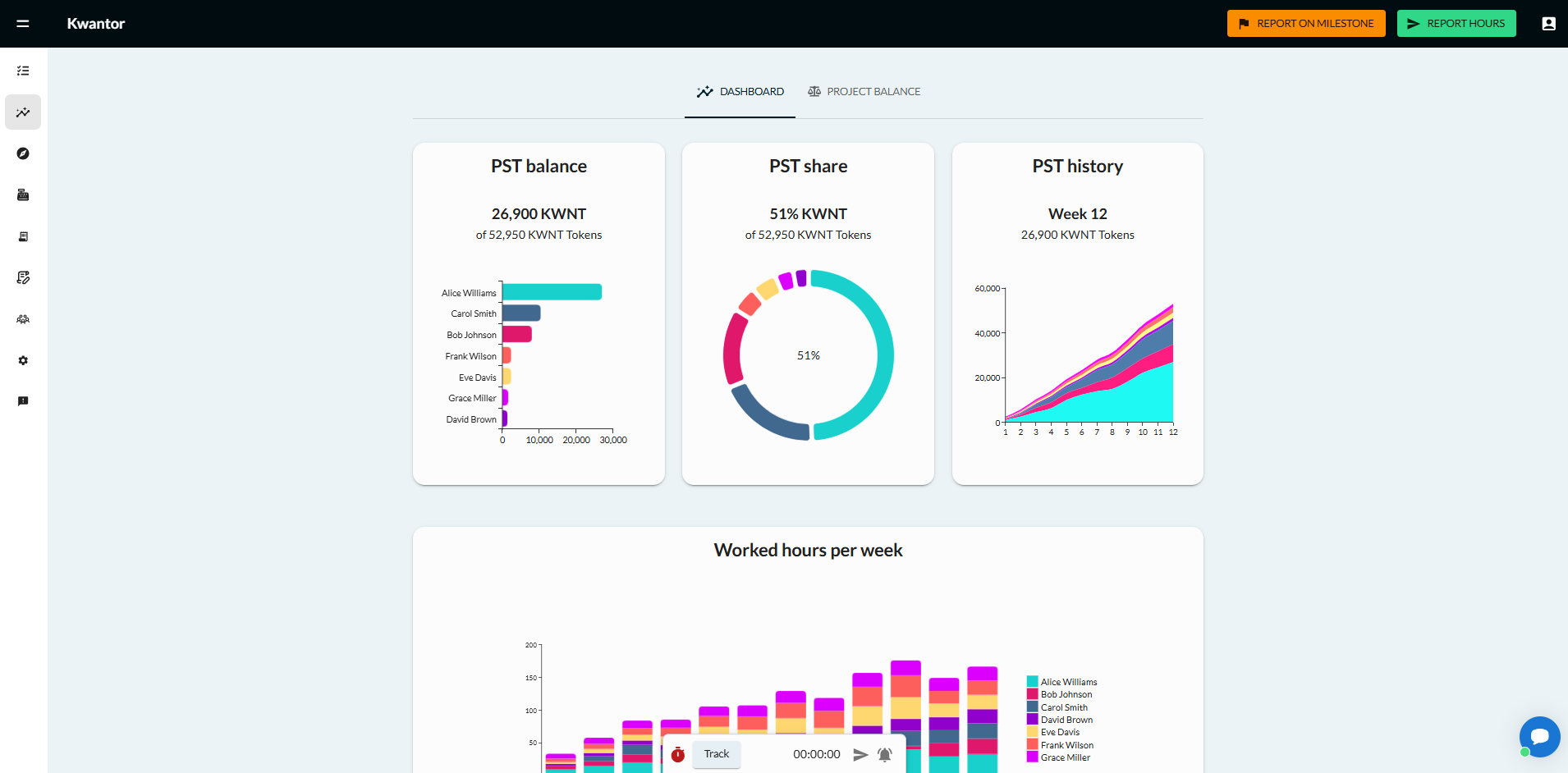Align incentives, manage your roadmap, track progress and pay out rewards with a tool that connects benefits to actual value contributed
Minimize cash need
Boost engagement
Reward with profit entitlements
Tailor compensation
Shorten time to market
Keep voting control
No notary deed for issuance
100% digital
We'll guide you through the process of creating your project, inviting contributors and creating and signing robust contracts. This is the first step in structuring your project on Kwantor.
Get startedReward contributors with Profit Share Tokens to balance direct rewards with long-term benefits


Grow your project assets financed through profit entitlements to reduce costs while remaining in control
You are going to use Profit Share Tokens (PSTs) as compensation for labor and investments, entitling holders to a share of profits.
Let's say you are a food-lover and invented a delicious lemonade recipe.
To test product–market–fit, you plan to operate a lemonade stand at a large three-day fair. Two friends, Alice and Bob, will help you make lemonade and decorate the stand.
Initial Investments
€500 for stand and day 1 supplies, plus €480 labor budget: €980 paid by you
Additional ingredients: €200 paid by Alice
Total initial cash: €1,180
Compensation Agreement
Each works 24 hours
Alice & Bob: €10/hour + 15 PSTs/hour
You: 25 PSTs/hour, no cash
Investments rewarded at 1 PST=€1
Profits distributed pro rata to PST holdings
Compensation Calculation
You:
Cash – none
€0
Labor PSTs – 24 h × 25 PSTs/h
600 PSTs
Investment PSTs – €980
980 PSTs
Total PSTs
1,580 PSTs
Alice:
Cash – 24 h × €10/h
€240
Labor PSTs – 24 h × 15 PSTs/h
360 PSTs
Investment PSTs – €200
200 PSTs
Total PSTs
560 PSTs
Bob:
Cash – 24 h × €10/h
€240
Labor PSTs – 24 h × 15 PSTs/h
360 PSTs
Profit Entitlements
Total PSTs issued: 2,500.
Profit shares:
You — 1,580 PSTs
63%
Alice — 560 PSTs
22%
Bob — 360 PSTs
14%
Fair Outcome
The fair is a massive success. You sell lemonade at €4 per cup and sell 1,000 cups, earning €4,000 in revenue.
You pay Alice and Bob their cash compensation of €240 each, using the €480 you put up for that.
Now it is time to distribute the earnings (€4,000) and calculate your profits.
Profit Distribution (by PST share)
You
63% of €4,000
€2,528
Less investment €980
−€980
Net profit
€1,548
Alice
22% of €4,000
€896
Plus cash €240
€240
Less investment €200
−€200
Net profit
€936
Bob
14% of €4,000
€576
Plus cash €240
€240
Net profit
€816
So what does this mean?
✅ Using PSTs allowed you to drastically reduce your cash need
✅ It allowed you to create assets without taking on debt
✅ You were able to optimize engagement
✅ You didn’t need to go to a notary to use a robust profit sharing instrument
Note that, in this scenario, Alice and Bob earned more than if they had been paid in cash only, as they received a share of the profits.
This is a win-win situation for everyone involved.
Project Balance
As of 2025-12-15Cash-paid assets
1180
Profit entitlement (PST)-paid assets
1320
Available cash balance
4000
Total Assets
6500
Capital contribution against profit entitlements (PSTs)
2500
Retained Earnings (accumulated profits from revenue)
4000
Total Equity
6500
Bootstrap your project and reward your team fairly with Profit Share Tokens. Our contract models let you get started quickly.
Minimize upfront capital
Reward early contributors
Fast digital setup
Pre incorporation
Get started quickly
Boost engagement with Profit Share Tokens by rewarding your team with a stake in the business. We connect you with a notary, ensuring a smooth process.
Boost engagement
Align rewards to KPIs
Maintain governance control
Maximize team performance
Billing period
Set up a Sandbox project to discover Kwantor and use all functionalities — entirely free.
Price per user per year
You are self-employed and want to develop your proposition. Suitable if you're not seeking to set up a legal entity (yet)
Price per user per year
€120
€108/ySet up a new business entity for your proposition and harness the power of Kwantor. We’ll connect you with a notary
Price per user per year
€300
€270/yBilling period
Price per user per year
€120
€108/yMembers to include:
You will be billed:
We will connect you to a notary that knows our contract models
100% online
Starting from
We want to reward you for helping us grow the Kwantor community
Refer your entrepreneurial friends and colleagues to Kwantor and earn a percentage of their first-year annual spend on a Kwantor Entrepreneur plan. The more you refer, the more you earn! And your referrals will also get an extra 10% discount on their first year subscription.
Only eligible entrepreneurs with a valid Dutch VAT registration may participate. Terms & conditions apply.of your referral's first-year annual spend on a Kwantor Entrepreneur plan
1st
10%
2nd
15%
3rd
20%
4th
25%
5th
30%
6th
35%
7th
40%
8th
45%
9th
50%
10th
55%
for the referred user on their first year subscription
That's on top of the 10% discount for their annual subscription!
Profit entitlements are rights granted to an individual or entity to receive a specified share of a project’s profits.
Profit Share Tokens are tokens that function as accounting unit for profit entitlement. Their technological robustness, efficiency and contractual embedding ensure that they can replace traditional profit shares in a secure and transparent manner.
Regular shares usually combine voting rights and profit rights and require a notary deed for issuance. Profit Share Tokens are only linked to profit rights (not voting rights) and do not require a notary deed for issuance.
No—Profit Share Tokens qualify as regular securities. Similar to cryptocurrencies, they do leverage distributed ledger technology for robustness and efficiency.
Yes—you can create a project with a Sandbox that is entirely free. You can invite others as well, or just explore it by yourself
Chat and email support is included in all plans.
Yes—EU citizens can use our model contracts, which apply Dutch law and designate Amsterdam courts for disputes. Enforcement abroad depends on the other country’s recognition rules. Consult a legal professional if in doubt.
Yes—non-Dutch citizens can generally set up a BV. For the notary deed, a notary may require your personal appearance or accept a signed power of attorney at their discretion.
Start rewarding your team today
Leverage the power of Kwantor to bootstrap your project and boost your team's engagement.